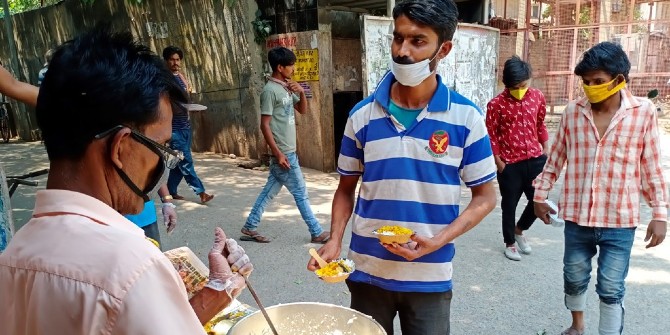Lockdowns are damaging, particularly to young people and those whose treatment for other diseases is delayed. One group has called for a different approach. Celia Blanco-Jimenez (LSE) sets out some of the arguments made at an LSE event on the trade-offs between protecting the NHS, saving lives and the harm caused by lockdowns.
“As infectious disease epidemiologists and public health scientists we have grave concerns about the damaging physical and mental health impacts of the prevailing COVID-19 policies, and recommend an approach we call Focused Protection.” – The ‘Great Barrington Declaration’.
The trade-offs between welfare and public policy are one of the themes of the LSE’s Shaping the Post-COVID World initiative. At an LSE online event on 2 December, Sally Davies, Paul Dolan, Sunetra Gupta, Carl Heneghan, and David Hunter discussed the ‘Great Barrington Declaration’, which calls for ‘focused protection’ as an alternative to lockdowns.
“Protect the NHS”
Since the beginning of the pandemic, one of the most powerful messages repeated by the UK government has been to “protect the NHS”. This has been the top priority, with saving lives coming second. It reflects structural problems in the NHS, which despite growing investment faces crisis each winter. Intensive care units easily overflow due to the lack of resources, and the point of overwhelm is reached faster than in countries such as Germany.
The strain caused by the pandemic was exacerbated by a lack of preparation and a shortage of PPE. Western countries failed to look to Asia for advice on handling pandemics, and suffered from a lack of flexibility in their response and belated policy decisions.
Are lockdowns effective?
The UK government initially planned for mitigation, then decided to move to a suppression strategy, or lockdown, after the first wave of infections. The combination of a late response and lack of NHS capacity led it to lock down.

But if the purpose of lockdowns is to reduce the number of infections and the number of deaths, we should also look at the origin of those infections: during the pandemic, 17.6% of infections were picked up while in hospital. This type of infection is unaffected by lockdown. A further 40% of the deaths happened in care homes, where the infection rate increased during lockdown. This was due to a lack of staff and infection control training, with staff moving between care homes and taking the virus with them. A large percentage of the disease burden is therefore not addressed by lockdown.
What does the alternative look like? It would involve shielding the vulnerable, and implementing focused protection while allowing immunity to accumulate. While it is true that immunity from COVID does not last forever, experience with other coronaviruses suggests subsequent infections are unlikely to be severe. A number of illnesses started as pandemics, and as immunity accumulated they became seasonal diseases. We live with them and accept the deaths they cause.
Trade-offs: the need for a debate
We prioritised “protecting the NHS” and “saving lives at any cost”, but what exactly are the costs? On 30 November the government declared that “it is not possible to assess the balance of these effects”. But evidence suggests these measures may not pass the cost-benefit test, as they lead to huge social and economic costs, lives lost due to cancer misdiagnoses and delayed treatment for other illnesses. The life years lost from cancer misdiagnoses may eventually be higher than those from COVID, and less strict lockdowns may therefore save more lives in the long term.
Some suggest that we need to at least try and define a checklist with the most important things that any policy should look at. Even when a cost benefit analysis is not possible, we can still look at outcomes of interest such as children, life years lost, and liberties.
One of these outcomes of interest should be inequality: we should care about inequalities over a lifetime, not a snapshot in time. Lockdowns are magnifying an intergenerational trade-off that has been happening for the last 40 years – we are asking young people to make big sacrifices for those who have already lived long lives. We cannot say here whether this is ethical or desirable, but we need to have a conversation about it where different voices with different perspectives are heard, especially those directly affected.
The government’s policy has had unwanted consequences, such as children out of school, mental health and wellbeing related problems, illness misdiagnoses and delayed treatment that lead to more deaths, and increased inequality across population and across generations. While all these decisions and priorities have been driven by a single perspective, their profound impacts on social, economic, health, and educational outcomes highlight the need for more voices than health professionals to be heard.
This post represents the views of the author and the event participants, and not those of the COVID-19 blog, nor LSE.





